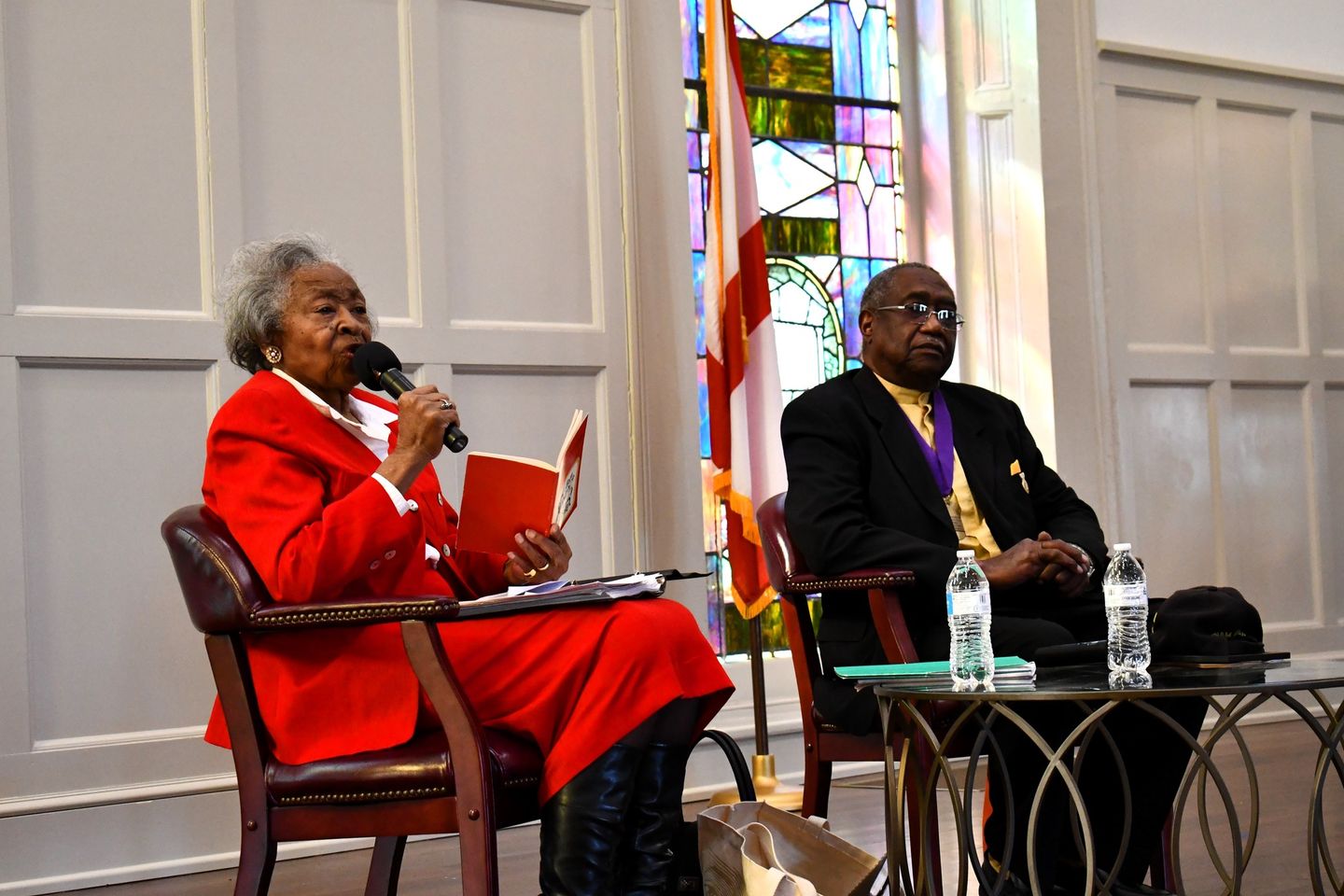On Wednesday, Feb. 14, at the MMI’s Anthony J. Center for Leadership hosted two distinguished speakers to celebrate #BlackHistoryMonth. Mrs. Willie Mae Crews and Mr. James Oaks both natives of Perry County and graduates of Lincoln Normal School. They both shared their experiences about growing up in rural Alabama and their participation in the civil rights movement: Mrs. Willie Mae Crews, a lifelong educator now living in Birmingham, referenced “What happens to a dream deferred… it explodes,” from the Langston Hughes poem “Harlem,” as she talked about the bus boycotts, sit-ins and marches of the 1960s. “It was an interesting time to see extraordinary people doing extraordinary things,” she noted. A lover of books and language, she closed with a list of “things to ponder” for the cadet audience, reminding them, “You are my now AND my future.”
Willie Mae Lee Crews was born into poverty in 1930s Alabama. Despite the difficult circumstances, she was raised by a tight-knit family who instilled in her a strong work ethic. Determined to better herself and escape the constraints of her small town, Willie Mae pursued higher education. She earned a scholarship to attend Dillard University in New Orleans and excelled academically. Undaunted by obstacles, she continued her education at Fisk University, achieving great success.
The 1960s and 1970s were a significant period in Willie Mae’s journey, as she embarked on a new role as a teacher at Hayes High School, an important institution for African Americans in Birmingham. This time marked a turning point in her life, where her passion for education and her dedication to the civil rights movement came together. As she taught and shared the oral histories of Alabama’s struggle for equality, Willie Mae became a crucial figure in preserving the stories of people who fought for justice. Through her lifelong commitment to teaching and oral history, she has had a lasting impact on countless individuals. Her students were fortunate to learn not just academic subjects, but also lessons in integrity, social responsibility, and self-confidence from her. These values continue to resonate with them even today.
Mr. James Oakes was born on a farm in Marion, Alabama during the bustling 1940s. His childhood was shaped by the values of hard work and perseverance, instilled in him by his parents. He grew up in a close-knit family environment and graduated from Lincoln Normal High School in 1965. Throughout his high school years, James excelled not only as a talented athlete on the basketball team, but also showcased his musical abilities by singing in the choir. During his youth, James also demonstrated a strong commitment to service and leadership. He held notable positions such as the Federation District and State of Alabama President for the National Farmers of America (NFA) from 1962 to 1964. It was during this time that he witnessed pivotal moments in history. James was present in Marion, Alabama on February 18, 1965, during a civil rights protest, where the tragic shooting of Jimmie Lee Jackson by an Alabama State Trooper took place. Despite the violence and unrest, James remained undeterred and stood alongside fellow activists during the Civil Rights demonstration on March 7, 1965, famously known as Bloody Sunday, at the Edmund Pettus Bridge in Selma, Alabama. In July 1966, James answered the call to serve his country by enlisting in the United States Marine Corps. He served bravely as an 81mm Mortar Man in Vietnam, demonstrating his valor and dedication on the battlefield. For his service, he was honored with several prestigious medals, including the Purple Heart Medal, symbolizing his sacrifice and bravery. After his military service, James returned to Marion, Alabama where he pursued higher education at Selma University for two years. It was there that he also found love, marrying Pellie Rutledge on September 13, 1970. The two embarked on a journey together that led them to Detroit, Michigan from July 1971 to June 1993, before eventually returning to their roots in Marion, Alabama where they still reside today. James Oakes is a pillar of strength and resilience. His life’s journey is marked by unwavering commitment to family, community, and country. His story serves as a testament to the values of hard work, perseverance, and dedication to service.











